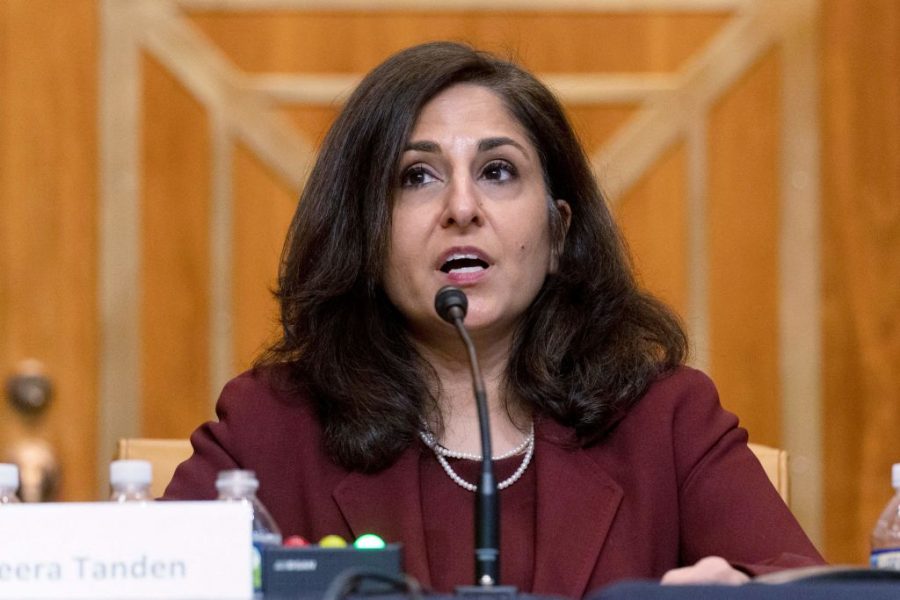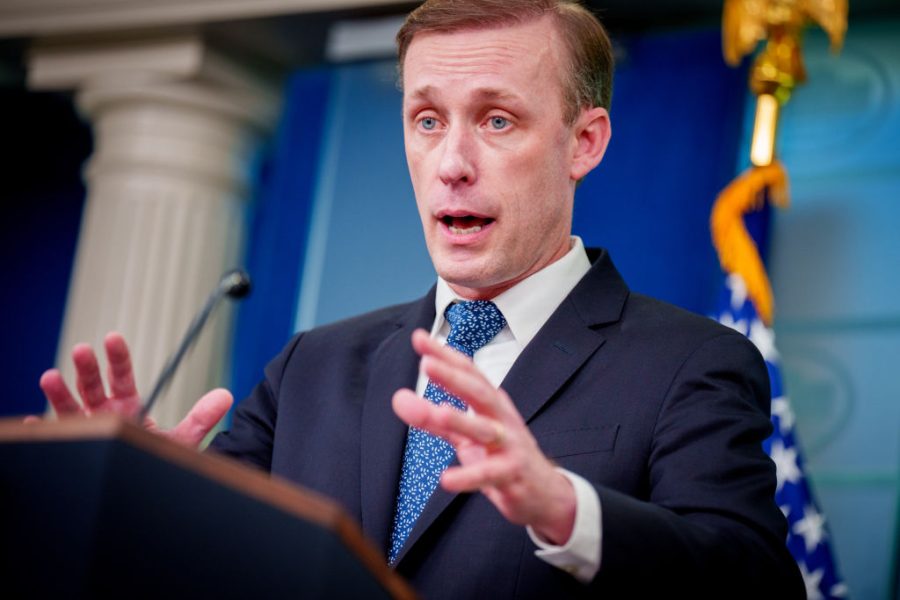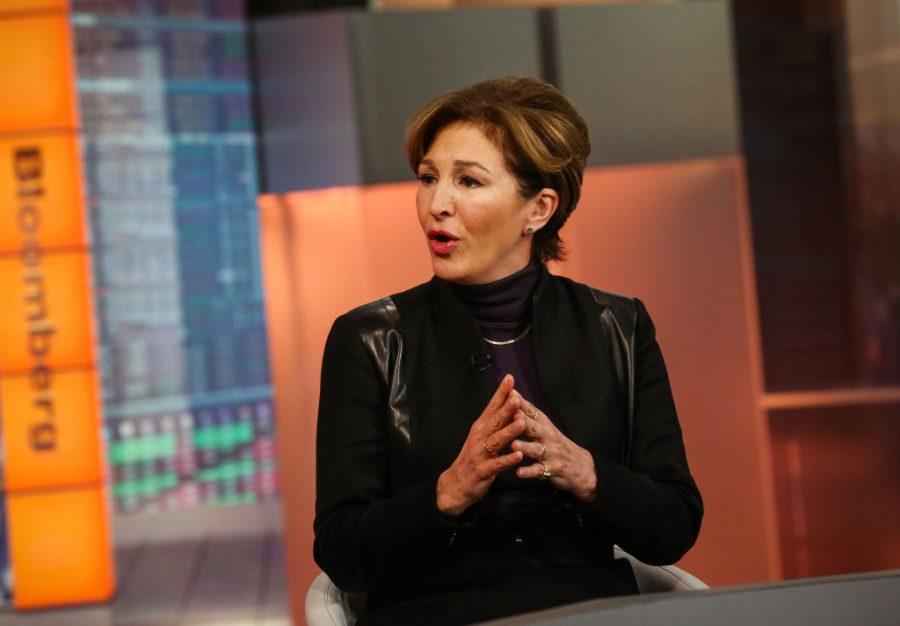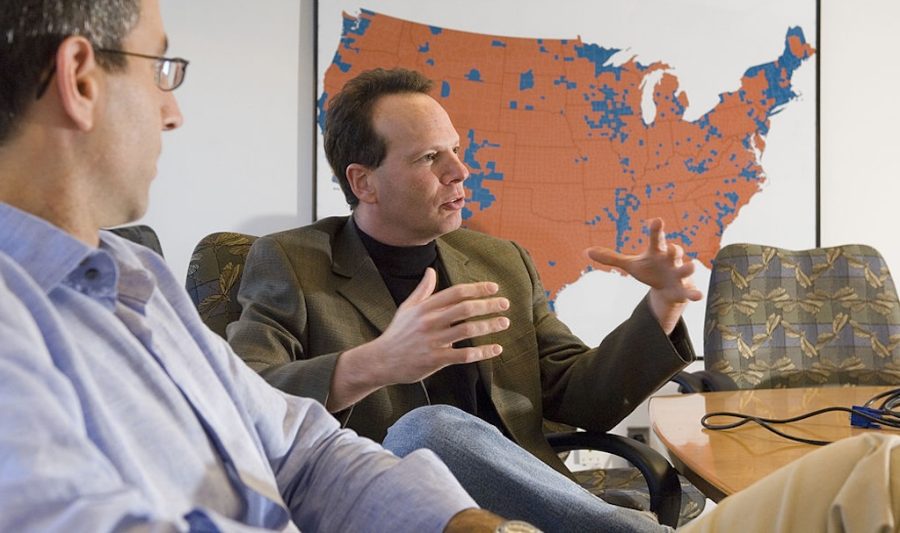Democrats’ Project 2029 Is Doubling Down on Failure
The Democrats' Project 2029 takes up the unique strategy of getting the very people who drove their party into the disastrous rut it is now stuck in to come up with the ideas that will get it out.

Former president Joe Biden awards Hillary Clinton the Presidential Medal of Freedom in a ceremony at the White House, on January 4, 2025, in Washington, DC. (Tom Brenner / Getty Images)
For anyone hoping Kamala Harris’s disastrous 2024 loss would make the Democratic Party drastically change direction, the bad news can be summed up in two words: Project 2029.
The New York Times reported earlier this month that Democrats are planning their own version of the right-wing policy blueprint that is the driving engine of Donald Trump’s presidency, which they’ll roll out piecemeal each quarter for the next two years in one of the party’s intellectual organs, Democracy: A Journal of Ideas. The man leading the effort is also that journal’s founder and coeditor: Andrei Cherny, a New Democrat wunderkind and (briefly) former Arizona Democratic party chair, who claims to have put together a team that’s “the Avengers of public policy.”
But based on the names we know so far, Cherny’s team is less the Avengers and more the Great Lakes Avengers — the hapless joke team of uselessly powered “heroes” who do more dying than saving the day. The Project 2029 brain trust now tasked with saving the Democratic Party is quite literally composed of the same line-up of people who brought the party to its knees in the first place, handing Donald Trump power not once, but twice.
The Democratic Party’s defeat was born of a combination of a decades-long rejection of working-class politics, corporate influence that has captured the party, and a foreign policy hawkishness out of step with a war-weary American public. But it seems Project 2029 is less about reckoning with this reality and more, as Semafor’s Dave Weigel put it, putting out “a Dem[ocratic] message disconnected from left-wing groups,” with one person who’s involved texting him that “the groups are the Achilles Heel of the Deomcratic Party [sic].”
In other words, rather than any change of course, this is a team assembled to double down on failure.
Andrei Cherny

That starts at the very top with Cherny himself, whose most recent project before this was a scandal-ridden corporate venture. For nine years, Cherny was the chief executive of celebrity-backed fintech firm Aspiration, which claimed to be democratizing investing by making it affordable for ordinary people and, in the process, being “in the business of fighting the climate crisis.”
In reality, as a series of exposés from ProPublica and others made clear, the firm sold itself through pathological deception: it boasted that it had planted thirty-five million trees, but counted twenty-three million that hadn’t actually been planted; it claimed that it had five million customers, but the actual number was a little less than six hundred thousand; it let customers round each purchase up to pay for planting a tree, but often pocketed many of the proceeds; it rewarded purchases from companies it deemed sustainable, but were in reality often pollutive; it trumpeted the chance to pay no fee on its investment fund, but actually charged a higher fee than many better performing funds; and far from being “one hundred percent fossil-fuel free,” that fund invested least in renewable energy while owning shares in a number of dirty companies.
Even the company’s claimed earnings were fudged by simply not counting the gargantuan amounts (ranging from $149–$366 million, according to a 2021 presentation) that it planned to spend on marketing.
Cherny was pushed out of the company in October 2022. But by then, he had already gotten the ball rolling on pivoting the struggling firm to carbon credits, which theoretically let companies make up for their pollution by putting money toward projects that take carbon out of the atmosphere — and which has long been accused of being a greenwashing scam industry. The move resulted in a series of possibly fraudulent deals struck under Cherny’s nose, which eventually earned the firm a federal probe and, most recently, the arrest of his former business partner.
The details of a lawsuit lay bare the less-than-sustainable reality of the industry into which Cherny had steered the firm. In order to ink a lucrative deal with oil-soaked Qatar for the 2022 FIFA World Cup — which was itself a tour de force of greenwashing — Aspiration needed a pile of carbon credits quickly, leading it to do what one executive called “a light version” of the due diligence it would have normally done on a deal that big. Perhaps as a result, the seller never delivered on the $30 million worth of credits they had agreed to.
All of this is a grim prelude to understanding Cherny’s political work, the cause of his life until the nine-year break he took for this ill-fated business venture. Cherny is a loud and proud evangelist for, and former member of, the Bill Clinton administration that laid much of the groundwork for the rise of Trump and the Democrats’ loss of working-class voters, as well as an alum of the corporate-funded Democratic Leadership Council, which was maybe best known for its enthusiasm for privatizing Social Security.
Cherny first showed up on Clinton’s radar as a Harvard senior, when he wrote that the United States needed “government humble enough not to try to solve all our problems for us but strong enough to give us the tools to solve our problems for ourselves.” Clinton loved the line so much, he made his entire Cabinet read it, put it in one of his speeches, and hired Cherny as a speechwriter. He was a perfect fit for an administration that had embarked on its own Democratic version of Trump’s DOGE initiative, called “Reinventing Government,” which boasted of firing three hundred fifty-one thousand federal workers and eliminating hundreds of thousands of pages of rules and regulations. (Some of those Clinton-era powers for carrying out this cull are now being used by Russell Vought to dismantle the federal government at Trump’s behest.)
Cherny cheered on all of it, rejoicing that Clinton had become his “true self”: not “a wild-eyed liberal mad with desire to insert the shadowy hand of the federal government into every nook and cranny of American life,” but a “raging centrist” who purged progressives, pushed budget cuts, and collaborated with Republicans. His “best period as president,” Cherny wrote, came “with Reinventing Government and the extraordinary passage of NAFTA,” and he celebrated that Clinton had cut the deficit, “eliminated scores of government programs,” and made the government “the smallest it has been since John F. Kennedy was president,” insisting that “centrist politics” is “what Americans want now” and “what they have always wanted.”
(More than a decade later, of course, as Hillary Clinton prepared for her own presidential run, Cherny sang the exact opposite tune: that both Clintons were lifelong economic populists who criticized corporate America and inequality, even as he defended her paid speeches to Wall Street banks.)
In what may be a sign of Cherny’s role in Project 2029, he wrote the Democrats’ losing 2000 platform in a process that was praised for its lack of debate and input from the dreaded “groups,” and its resulting centrist direction, full of “positions that easily could have come from Republican platforms of a generation ago,” as the Los Angeles Times put it. That included support for the death penalty and “open trade,” a boast that Democrats had “ended the era of big government,” and a vow to eliminate the national debt in twelve years.
Cherny beamed with pride that the document’s hawkishness showed “the shift in the party on national security” and that “the old siren songs no longer have a place.” Later, as the country faced whiplash from George W. Bush’s disastrous series of Middle East invasions, Cherny took the side of rabid war-hawk Joe Lieberman, who complained that Democrats were no longer talking about expanding the size of the military, but pulling out of Iraq. There was “a large grain of truth” in what Lieberman was saying, said Cherny, and he predicted that the eventual Democratic nominee would return to themes like “expanding democracy around the world and using force to advance American values.”
Cherny’s view at the turn of the century was that the US manufacturing economy of the twentieth century was irretrievably gone — virtually an act of God as the world evolved from a “machine age to a global information age” — and that the role of government had to change from providing economic security to providing “opportunity” and “choice.” He viewed Clinton’s dissolution of welfare as a great triumph and celebrated that Democrats who planned to “put the Humpty-Dumpty welfare state back together again” were slowly dying out.
As the years went by, that didn’t change. In 2005, he insisted that Clinton’s small-government vision was one “Democrats would be wise to revisit,” and chided them for “decrying ‘outsourcing’.” In 2012, he maintained that the party should continue to “appeal to a rising electorate that is not only more diverse but holds very different expectations from government and politicians than the aging New Deal generation.”
But Cherny’s certainty, as he said in 1998, that there would come a “period when the people who came of age in the Great Depression, New Deal, and World War II are replaced in the electorate by voting groups with very different outlooks,” and that Democrats had to “be ready” for that, never quite worked out. Thirty years out from Clinton’s shredding of government and the US manufacturing sector, and a decade on from Obama’s failure to keep average Americans whole and punish fraudsters during the Great Recession, younger voters are most in favor of taxing the rich and giving the government a bigger role in health care, while a record share of Americans want the government to do more to help people.
Neera Tanden

Next is another Clintonite, longtime Democratic operative Neera Tanden, currently back at her perch heading the Center for American Progress (CAP). Tanden’s past experience won’t inspire confidence for this project: neither her role as a close adviser for Hillary Clinton’s doomed 2016 run, nor her most recent work as head of the Domestic Policy Council for a Biden administration that voters widely viewed as out of touch on domestic policy.
Nor will Tanden’s longtime closeness with corporate America. CAP doesn’t publicize its donors, but in 2013, journalist Ken Silverstein obtained a list of them. On it was just about every malign corporate interest you can think of, from pharmaceutical giant Pfizer and health insurance behemoth United Healthcare Group — which, besides regularly stiffing its own sick customers, has spent decades blunting progressive pushes for health care reform — to big banks like Citigroup, poverty employer Walmart, and weapons manufacturers like Lockheed Martin. Over the six years that followed, CAP took in $33 million from financial firms, finance executives, and private foundations founded by Wall Street-generated wealth.
A good example of Tanden’s approach to politics was found in the 2016 WikiLeaks dump of Clintonworld emails. When Tanden was told another Clinton adviser had met with Blackstone real estate head Jon Gray, Tanden praised Gray, adding: “given he will take over Blackstone, [he’s] one to develop a real relationship with.” Blackstone at that point had been operating as a massive slumlord and had its sights set on Americans’ retirement savings. Tanden’s enthusiasm for courting an alliance with such a firm speaks volumes.
Not surprisingly, this corporate influence has been reflected in Tanden’s politics over the years. During the Obama years, Tanden and CAP led the charge for cutting Social Security and other benefits, with Tanden even going on C-SPAN to outline at length the then president’s planned cuts to Medicare and her plans to “reform” Social Security, noting that “some of our progressive allies aren’t as excited about that as we are.”
Later, in 2016, Tanden voted against every single progressive policy while on the Democratic platform drafting committee, including votes against single-payer healthcare and a $15 minimum wage — a policy that has proven again and again to be a political winner with working-class voters across partisan lines.
She also voted against acknowledging the Israeli occupation of Palestinian land, part of a wider pattern of deference to Israel that puts Tanden out of step with both the Democratic electorate and, increasingly, voters as a whole. That was part of a bigger trend of Tanden censoring internal criticism of Israel and Benjamin Netanyahu while giving him and other right-wing Israeli officials progressive cover as they increasingly bucked US interests and her own party specifically. Fealty to an out-of-control Israel was a big ingredient in the Democratic loss in 2024, but Tanden’s appointment doesn’t suggest that that’s been understood.
Jake Sullivan

Yet another ex–Hillary Clinton adviser, Sullivan is most obviously unsuitable for shaping the future of Democratic foreign policy because of his recent career experience running it.
Multiple insider accounts peg Sullivan as not just the leading mind behind a declining Biden’s entire disastrous foreign policy strategy — it was Sullivan’s “brainchild,” a new vision that served as the “backbone” for and “infused every corner of [the Biden] administration’s foreign policy,” according to the author of one acclaimed behind-the-scenes tell-all — but as the one shaping what Biden actually did at any given moment: Sullivan’s job, as reported by the Wall Street Journal, was to “present an analysis of the options” to an increasingly addled Biden who then made the final decisions.
The biggest stain on Sullivan’s tenure is the genocide in Gaza during Biden’s final year, a monstrous crime that he fully supported. Two months after leaving the White House, Sullivan made explicitly clear that, in hindsight, he still personally opposed withholding military aid from Israel as leverage to change its behavior, and that he held no regrets around not “squeezing Netanyahu more.” The result was not just a world-historical bloodbath, but that Sullivan managed to destroy US global standing, the administration’s own plans for the region, the post–World War II global order, and the possibility of a two-state solution, all at the same time.
Things were little better with Sullivan’s other big project, the war in Ukraine. One of the most appallingly cynical gambits in recent memory, the Ukraine strategy sought to, in Sullivan’s words, make “Russia pay a longer-term price” by funneling weapons to a constant stream of doomed Ukrainian conscripts, a strategy that involved making sure the war didn’t stop too soon.
To that end, Sullivan made sure to overrule US military brass who suggested pivoting to peace talks at the close of the war’s first year, when Kyiv had its strongest negotiating position, with the National Security Council he led reportedly “the most resistant” to such talks. That decision prolonged the war by two years and counting, during which time Ukraine has been physically, economically, and demographically ravaged; lost its battlefield advantage and continues to steadily lose territory; it has also seen Moscow switch to vastly harsher bargaining terms that it wouldn’t have been able to demand earlier in the war.
Sullivan’s slogan of a “foreign policy for the middle class” turned out to be just that: a slogan. Far from refocusing on domestic priorities and revitalizing the US economy — a policy shift that would have been good for both the country and his party — Sullivan infuriated struggling Americans by sending out a bottomless flow of billions of their dollars to foreign wars (wars that, incidentally, worsened their financial struggles). The one Biden foreign policy decision that actually fit within this vision, the withdrawal from Afghanistan, was also the one that Sullivan disagreed with the president about.
At the end of his tenure, Sullivan told the Washington Post’s David Ignatius that he thought of himself as an Austin Powers character: specifically, the evil henchman in the first movie who stands screaming in front of a steamroller, ignoring the pleas to get out of the way, as it very slowly moves toward and ultimately crushes him. Sullivan was trying to make an analogy about US officials witnessing Russia’s preparations to invade Ukraine in 2022, but he accidentally came up with the perfect metaphor for his entire role in US foreign policy: a man complicit in evil, ignoring every opportunity to get away from avoidable, fatal disaster, while acting like he’s powerless to do anything about it.
Anne-Marie Slaughter

Speaking of generational foreign policy disasters, the Project 2029 advisory board contains still another former Clinton official who had a hand in one of her own: Anne-Marie Slaughter.
The aptly named Slaughter played a major role in the Libya regime-change debacle, which Barack Obama himself admitted was his worst foreign policy decision. The decision to involve the United States in an internal crisis in Libya and then shift midway through to trying to topple dictator Muammar Gaddafi was an epochal disaster that continues to ripple throughout the region, having set off a chain of violence across the Middle East and North Africa that has led to more disastrous Western military intervention, an explosion of armed extremism, and the toppling of governments, all while contributing to a migrant crisis that has fed the rise of Europe’s far right.
Slaughter, who had left the State Department earlier that year but continued to act as an unofficial quasi-adviser to then Secretary of State Hillary Clinton, used her access to push Clinton into leading the charge for the fiasco, which she was also urging publicly. In her emails to Clinton, Slaughter insisted that intervening in Libya would “impress the young people across the Middle East” and “change the image of the United States overnight,” and she waved away what she admitted were the “million reasons NOT to act,” including that the United States would “get enmeshed in a civil war, that we cannot go into another Muslim country, that Gaddafi is well armed.”
Slaughter was completely wrong. A year on, the intervention proved deeply unpopular across the Arab world and did nothing for US standing among Muslims. The one thing she was correct about was her claim that the operation created “a chance to support a real new beginning in the Muslim world ” — technically true, since the fallout would drive the growth of terrorism in fourteen different countries across the region.
Slaughter got embroiled in another controversy shortly after, when she became CEO of think tank New America. According to the New York Times, in a report based on emails provided to the paper, in 2017 Google head honcho Eric Schmidt informed Slaughter of his unhappiness with one of New America’s programs that had a habit of criticizing Google and other tech companies’ monopolistic practices. She quickly scuttled the program and accused the scholar leading it of “imperiling the institution as a whole.” The episode doesn’t bode well for anyone hoping a future Democratic Party will confront corporate power or at least resist its influence.
Justin Wolfers

Many would likely agree with a lot of University of Michigan economist Justin Wolfers’s criticisms of the Trump administration. The trouble is that Wolfers also spent the past two years as one of the most prominent, insistent voices telling Democrats that US voters’ very real economic struggles under Biden were all in their head.
Americans were “telling themselves stories that are completely at odds with the reality,” he told MSNBC’s Stephanie Ruhle, claiming that it was all a matter of voters looking at the economy through “partisan lenses.” “The economy is good. Full stop,” he insisted.
“Simple economic logic suggests that neither your well-being nor mine depends on the absolute magnitude of the numbers on a price sticker,” he wrote in the New York Times last April. Sure, he wrote, prices had gone up, but people’s hourly pay had ballooned by the same amount, meaning that “the world has a lot more zeros in it, but nothing has really changed.”
This kind of talk was, of course, offensively patronizing and elitist. But it was also wrong. In reality, it was Wolfers who was blinded by partisanship, telling himself and his party bedtime stories, by focusing only on macroeconomic indicators and ignoring the plethora of other data that showed Americans were experiencing very real economic hardship: a sharp nationwide jump in evictions, cost-burdened renters at an all-time high, spiking poverty and food insecurity rates, a historic increase in child poverty, record-high homelessness, and soaring demand for food banks, to name a few.
Wolfers insisted that high consumer spending was a measure of the country’s optimism because, he argued, people would stop spending if they really thought there was bad news around the corner. He ignored the fact that that spending was built on a historically high accumulation of credit card debt, which, thanks to skyrocketing interest rates, only added to Americans’ cost pressures.
This advice wasn’t just wrong; it proved politically disastrous. The Biden White House and the rest of the Democratic Party listened to Wolfers and others like him, and simply ignored what they believed was a delusional public, offering and doing nothing to alleviate what they were told was a nonexistent economic crunch until it was too late. At the same time, Wolfers strenuously argued against the objectively real role of corporate greed in inflation, something that, at this point, has been recognized by a Federal Reserve study, the world’s central banks, and the Wall Street Journal.
Jim Kessler

The main thing to know about Third Way, the organization for which Jim Kessler has served as vice president for policy for the better part of the last two decades, is that by its own admission “the majority of [its] financial support” comes from the “finance sector” — specifically, from the current and former finance titans that sit on its board of trustees. That came from the mouth of its senior vice president back in 2013, who said that they “write us personal checks.”
There is little sign that this state of affairs has changed. Today, all but three of Third Way’s thirty-two serving trustees hail from the corporate world (a generous count, since one of those three is billionaire heiress Rachel Pritzker), with a heavy emphasis on finance: twenty-three of those trustees currently serve or have worked in the finance industry, including seven from private equity firms like Warburg Pincus, Apollo Global Management, and SouthOcean Capital. Eight are current or former executives with big banks like Goldman Sachs, Wells Fargo, JPMorgan, and Morgan Stanley.
You will likely not be surprised to learn, then, that the political vision of Third Way and Kessler specifically has often been disconnected from the reality the rest of us live in.
Case in point: in February 2007, as the early signs of the coming financial crisis were coming into view, Kessler coauthored a Third Way report about the exciting new economy of the twenty-first century and some of its critics. It derided “neopopulists” who “believe that the tide of change will bring an unfettered race to the bottom, in which the rich get inexorably richer while the rest of America works harder to earn less.”
These critics were driven “by three tenets that are, in actuality, myths,” Kessler and his colleagues wrote: that the middle-class is failing, the country is declining, and that corporations control everything. For good measure, the report also dismissed the importance of the jobs offshored by NAFTA, as well as the idea that Americans were “drowning in debt,” since, they wrote, it was mortgage debt and most families wouldn’t consider that bad debt. (Two years later, because of the crash, nearly a quarter of all homeowners owed more on their mortgage than their actual house was worth.)
This assessment obviously aged like milk on a summer’s day. But it wasn’t the only poor judgement Kessler would exhibit over the last nineteen years, which have seen him at various times say that:
- it is wrong and bad strategy to offer a “pessimistic” vision of a country in decline, just a year out from the first dominoes of the 2008 financial crisis falling (a few years later, he violated his own advice and painted a gloomy portrait of a “once-great and now stagnating nation,” in this case to justify budget cuts);
- the “road to transformational change is going through the moderates” like Blanche Lincoln, who would “be instrumental in passing the Obama agenda” — shortly before Lincoln in particular blocked large swaths of Obama’s agenda;
- a “public plan is not the essential element of reform” of the health care sector, with its exclusion eventually ensuring that Obamacare would be a giveaway to health insurance companies — before declaring, once the bill became law, that “the eighty-year Democratic quest to build the best possible safety net is essentially over,” and imploring Democrats to forget about trying to expand it any more;
- he “prefer[s] a grand bargain” — referring to Obama’s push at the time to cut Medicare and Social Security to lower the deficit — before criticizing a union-led campaign opposing it;
- Washington should cut those entitlement programs and contribute less to federal workers’ pensions;
- “nothing would be more disastrous for Democrats” than embracing economic populism, and that they should — what else? — cut entitlements instead;
- instead of New Deal–style policies like a federal jobs guarantee, Democrats should instead push ideas like an AmeriCorps for baby boomers, private pension accounts, and a “regional minimum wage” — one whose baseline would be arbitrarily set at a paltry $12 an hour, and would let employers pay workers even less than that depending on where in the country they lived.
It’s almost impressive that of all the names on this list, Kessler may be the least suited to lecturing anyone about how to win back working-class voters.
Committed to Failure
The world of 2025 is not the same one of decades earlier: Americans don’t like the undue influence of corporate power; they want their government to do more for them; they’re tired of war; they’ve been devastated by decades of offshoring and austerity; and, as they have made repeatedly clear, they’re not fans of the Clinton family. The Democratic Party has been politically decimated and currently sits at a historic low point in popularity precisely because it has stubbornly refused to acknowledge any of this.
If you think this strategy of tasking the very architects of this failure — a group of corporate-backed Clinton loyalists who spent their careers cheering on free trade, social spending cuts, and the end of US manufacturing — with drawing up the blueprints for the way out of it doesn’t make sense, you’re not crazy. You’re just seeing firsthand why the Democratic Party is historically disliked by a majority of Americans and its own voters.